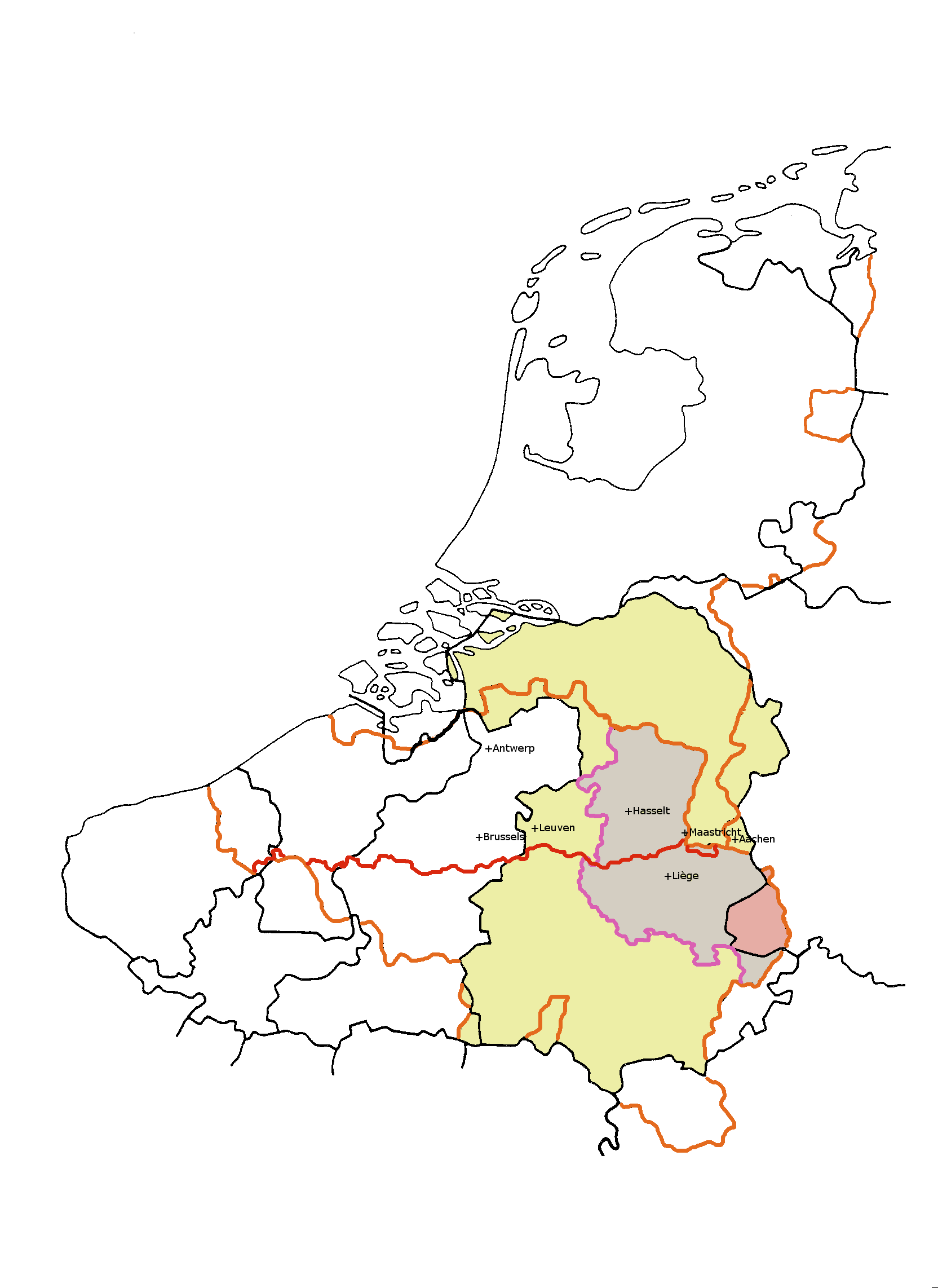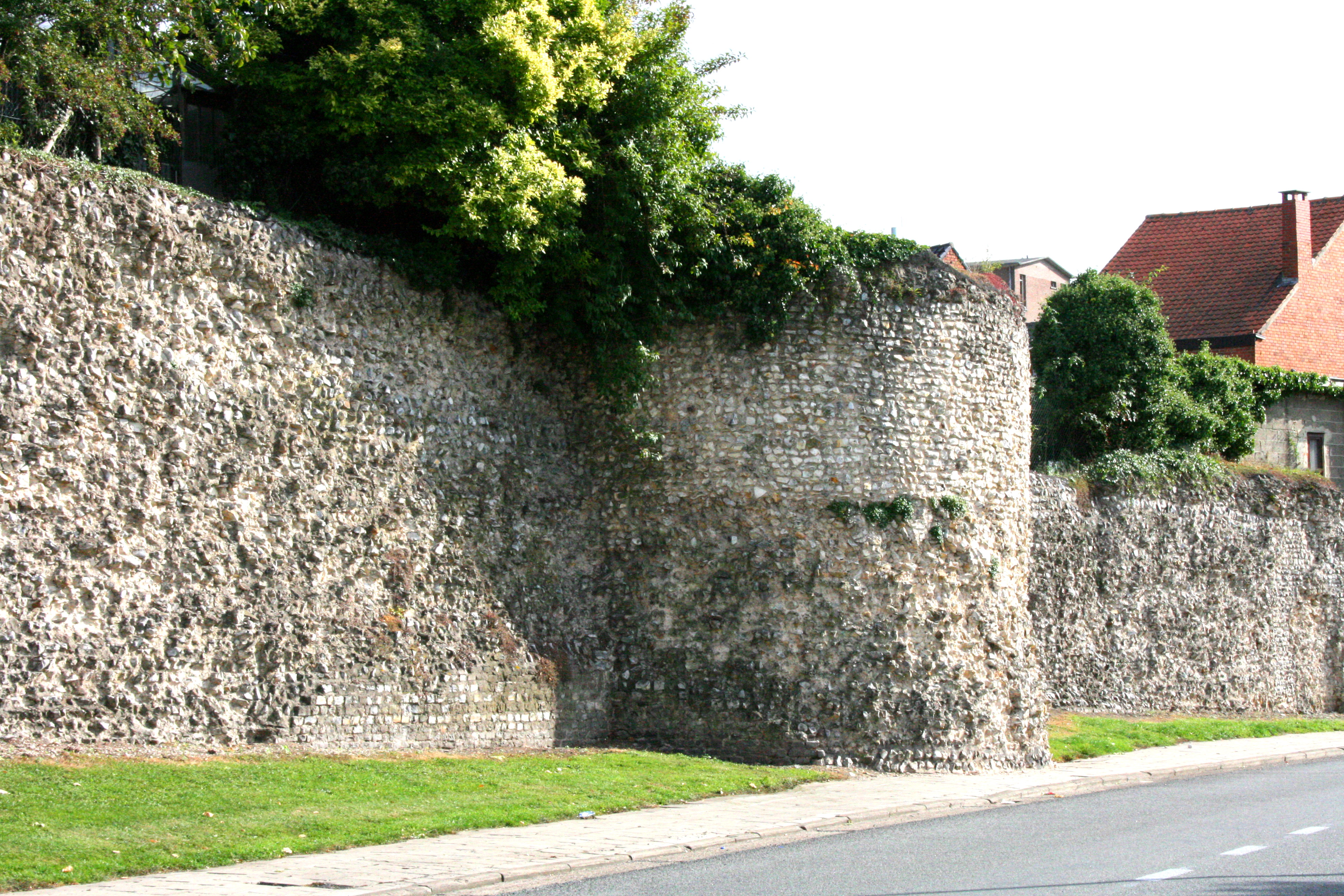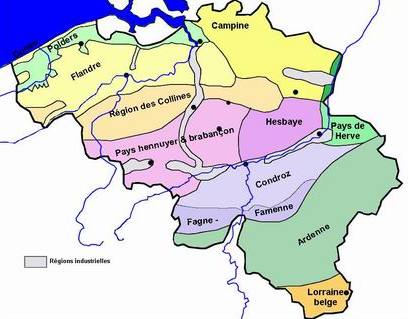|
Tungri
The Tungri (or Tongri, or Tungrians) were a tribe, or group of tribes, who lived in the Belgic part of Gaul, during the times of the Roman Empire. Within the Roman Empire, their territory was called the ''Civitas Tungrorum''. They were described by Tacitus as being the same people who were first called "''Germani''" ( Germanic), meaning that all other tribes who were later referred to this way, including those in Germania east of the river Rhine, were named after them. More specifically, Tacitus was thereby equating the Tungri with the "''Germani Cisrhenani''" described generations earlier by Julius Caesar. Their name is the source of several place names in Belgium, Germany and the Netherlands, including Tongeren, Tongerlo Abbey, and Tongelre. image:Germanie-inferieure.jpg, 301x301px, The Roman province of Germania Inferior, showing Atuatuca, modern Tongeren, the capital of the Tungri (Tongres). Places associated with the Tungri are in bright green. It was on the road between Amiens ... [...More Info...] [...Related Items...] OR: [Wikipedia] [Google] [Baidu] |
Civitas Tungrorum
The ''Civitas Tungrorum'' was a large Roman administrative district dominating what is now eastern Belgium and the southern Netherlands. In the early days of the Roman Empire it was in the province of Gallia Belgica, but it later joined the neighbouring lower Rhine River border districts, within the province of Germania Inferior. Its capital was ''Aduatuca Tungrorum'', now Tongeren. Like many other Roman administrative districts, it was named after the tribal grouping that lived there, the Tungri, although that name is not known from the area before it became part of the Roman Empire. Also like other such districts, it became the basis for a medieval bishopric, but the bishops of Tongeren moved first to nearby Maastricht and then to Liège. Location The geographical boundaries of the ''civitas'' probably corresponded at least roughly to the area of the large medieval Catholic diocese of Liège, which was reduced in 1559. In modern terms this large diocese contained approximately th ... [...More Info...] [...Related Items...] OR: [Wikipedia] [Google] [Baidu] |
Eburones
The Eburones (Greek: ) were a Gallic- Germanic tribe dwelling in the northeast of Gaul, in what is now the southern Netherlands, eastern Belgium and the German Rhineland, in the period immediately preceding the Roman conquest of the region. Though living in Gaul, they were also described as being both Belgae and Germani (for a discussion of these terms, see below). The Eburones played a major role in Julius Caesar's account of his "Gallic Wars", as the most important tribe within the ''Germani cisrhenani'' group of tribes — ''Germani'' living west of the Rhine amongst the Belgae. Caesar claimed that the name of the Eburones was wiped out after their failed revolt against his forces during the Gallic Wars, and that the tribe was largely annihilated. Whether any significant part of the population lived on in the area as Tungri, the tribal name found here later, is uncertain but considered likely. Name Attestations They are mentioned as ''Eburones'' by Caesar (mid-1st c. ... [...More Info...] [...Related Items...] OR: [Wikipedia] [Google] [Baidu] |
Germani Cisrhenani
The ''Germani cisrhenani'' (Latin '' cis- rhenanus'' "on this side of the Rhine", referring to the Roman or western side), or "Left bank ''Germani''", were a group of Germanic peoples who lived west of the Lower Rhine at the time of the Gallic Wars in the mid-1st century BC. These ''Germani'' were first described by Julius Caesar, who was writing specifically about tribes near the Meuse river, who had settled among the Belgae before Roman intrusion into the area. Tribes who Caesar named as being among the ''Germani cisrhenani'' included the Eburones, the Condrusi, the Caeraesi, the Segni and the Paemani. Tacitus, writing around 100 AD when the region had been part of the Roman Empire, referred to these ''Germani'' next, saying that they were by his time called the Tungri. The "''Germani''" name had by this time become a term used more commonly to refer to many other peoples. Name and terminology Starting with Caesar, Roman historians described the Rhine as an important natura ... [...More Info...] [...Related Items...] OR: [Wikipedia] [Google] [Baidu] |
Aduatuci
The Atuatuci (or Aduatuci) were a Gauls, Gallic-Germanic peoples, Germanic tribe, dwelling in the eastern part of modern-day Belgium during the Iron Age Europe, Iron Age. They fought the Roman armies of Julius Caesar during the Gallic Wars (58–50 BC). In the Battle of the Sabis (57 BC), the Atuatuci sent troops to assist their Belgae, Belgic neighbours, the Nervii, Atrebates and Viromandui, but were too late to avoid an eventual Roman victory. After they withdrew to their oppidum (fortress), the Atuatuci were later defeated by the Romans during the siege of the Atuatuci (57 BC). According to Caesar, 4,000 of the Atuatici perished in the seizure of their stronghold, and 53,000 of them were reduced to slavery. Several years later in 54 BC the Atuatuci suffered further retribution when they were involved with their neighbours in a failed rebellion against the Romans. Following the devastation of the tribe, which left only a number of small groups, the Atuatuci disappeared from histo ... [...More Info...] [...Related Items...] OR: [Wikipedia] [Google] [Baidu] |
Menapii
The Menapii were a Belgic tribe dwelling near the North Sea, around present-day Cassel, during the Iron Age and the Roman period. Name Attestations They are mentioned as ''Menapii'' by Caesar (mid-1st c. BC) and Orosius (early 5th c. AD), ''Menápioi'' (Μενάπιοι; var. Μονάπιοι, Μενάσπιοι) by Strabo (early 1st c. AD) and Ptolemy (2nd c. AD), as ''Menapi'' by Pliny (1st c. AD) and the '' Notitia Dignitatum'' (5th c. AD), and under the accusative forms ''Menapios'' by Tacitus (early 2nd c. AD) and ''Menapíous'' (Μεναπίους) by Cassius Dio (3rd c. AD)., s.v. ''Menapii'' and ''Castellum Menapiorum''. Etymology The Gaulish ethnonym ''Menapii'' has been phonetically compared with '' Manapii'', the name of a tribe from southeastern Ireland mentioned by Ptolemy in the 2nd century AD. These tribal names may ultimately derive from a Proto-Celtic form reconstructed as *''Menakwī'' or *''Manakwī'', whose meaning remains uncertain, perhaps the 'mou ... [...More Info...] [...Related Items...] OR: [Wikipedia] [Google] [Baidu] |
Tongeren
Tongeren (; french: Tongres ; german: Tongern ; li, Tóngere ) is a city and municipality located in the Belgian province of Limburg, in the southeastern corner of the Flemish region of Belgium. Tongeren is the oldest town in Belgium, as the only Roman administrative capital within the country's borders. As a Roman city, it was inhabited by the Tungri, and known as ''Atuatuca Tungrorum'', it was the administrative centre of the ''Civitas Tungrorum'' district. History ''Atuatuca Tungrorum'' The Romans referred to Tongeren as ''Aduatuca Tungrorum'' or ''Atuatuca Tongrorum'', and it was the capital of the large Roman province of ''Civitas Tungrorum'', an area which covered modern Belgian Limburg, and at least parts of all the areas around it. Before the Roman conquests, this area was inhabited by the group of Belgic tribes known as the ''Germani cisrhenani''. (Despite being known as the ''Germani'', whether they spoke a Germanic language is debated, and the names of their tribes ... [...More Info...] [...Related Items...] OR: [Wikipedia] [Google] [Baidu] |
Belgae
The Belgae () were a large confederation of tribes living in northern Gaul, between the English Channel, the west bank of the Rhine, and the northern bank of the river Seine, from at least the third century BC. They were discussed in depth by Julius Caesar in his account of his wars in Gaul. Some peoples in Britain were also called Belgae, and O'Rahilly equated them with the Fir Bolg in Ireland. The Belgae gave their name to the Roman province of Gallia Belgica and, much later, to the modern country of Belgium; today "Belgae" is also Latin for "Belgians". Etymology The consensus among linguists is that the ethnic name ''Belgae'' comes from the Proto-Celtic root ''*belg-'' or ''*bolg-'' meaning "to swell (particularly with anger/battle fury/etc.)", cognate with the Dutch adjective ''gebelgd'' "very angry" (weak perfect participle of the verb ''belgen'' "to become angry") and ''verbolgen'' "being angry" (strong perfect participle of obsolete ''verbelgen'' "to make angry"), as well ... [...More Info...] [...Related Items...] OR: [Wikipedia] [Google] [Baidu] |
Germania
Germania ( ; ), also called Magna Germania (English: ''Great Germania''), Germania Libera (English: ''Free Germania''), or Germanic Barbaricum to distinguish it from the Roman province of the same name, was a large historical region in north-central Europe during the Roman era, which was associated by Roman authors with the Germanic peoples. The region stretched roughly from the Middle and Lower Rhine in the west to the Vistula in the east. It also extended as far south as the Upper and Middle Danube and Pannonia, and to the known parts of Scandinavia in the north. Archaeologically, these peoples correspond roughly to the Roman Iron Age of those regions. While apparently dominated by Germanic peoples, Magna Germania was also inhabited by Celts. The Latin name ''Germania'' means "land of the Germani", but the etymology of the name ''Germani'' itself is uncertain. During the Gallic Wars of the 1st century BC, the Roman general Julius Caesar encountered peoples originating from ... [...More Info...] [...Related Items...] OR: [Wikipedia] [Google] [Baidu] |
Condrusi
The Condrusi were an ancient Belgic- Germanic tribe dwelling in what is now eastern Belgium during the Gallic Wars (58–50 BC) and the Roman period. Their ethnic identity remains uncertain. Caesar described them as part of the Germani Cisrhenani, but their tribal name is probably of Celtic origin. Like other Germani Cisrhenani tribes, it is possible that their old Germanic endonym came to be abandoned after a tribal reorganization, that they received their names from their Celtic neighbours, or else that they were fully or partially assimilated into Celtic culture at the time of the Roman invasion of the region in 57 BC. Name They are mentioned as ''Condrusos'' and ''Condrusi'' by Caesar (mid-1st c. BC), and as ''Condurses'' by Orosius (early 5th c. AD)., entry 1967. The meaning of the name ''Condrusi'' remains unclear. The prefix is most likely the Gaulish ''con-/com-'' ('with, together, as well'), and although the translation of the element ''-drus-'' is unknown, it is also g ... [...More Info...] [...Related Items...] OR: [Wikipedia] [Google] [Baidu] |
Germania Inferior
Germania Inferior ("Lower Germania") was a Roman province from AD 85 until the province was renamed Germania Secunda in the fourth century, on the west bank of the Rhine bordering the North Sea. The capital of the province was Colonia Agrippinensis (modern-day Cologne). Geography According to Ptolemy (2.9), Germania Inferior included the Rhine from its mouth up to the mouth of the ''Obringa'', a river identified with either the Aar or the Moselle. The territory included modern-day Luxembourg, the southern Netherlands, part of Belgium, and part of North Rhine-Westphalia in Germany, west of the Rhine. The principal settlements of the province were Castra Vetera and Colonia Ulpia Traiana (both near Xanten), Coriovallum (Heerlen), Albaniana ( Alphen aan den Rijn), Lugdunum Batavorum (Katwijk), Forum Hadriani (Voorburg), Ulpia Noviomagus Batavorum (Nijmegen), Traiectum (Utrecht), Atuatuca Tungrorum (Tongeren), Bona (Bonn), and Colonia Agrippinensis (Cologne), the capital of Ger ... [...More Info...] [...Related Items...] OR: [Wikipedia] [Google] [Baidu] |
Sicambri
The Sicambri, also known as the Sugambri or Sicambrians, were a Germanic people who during Roman times lived on the east bank of the river Rhine, in what is now Germany, near the border with the Netherlands. They were first reported by Julius Caesar, who described them as Germanic (''Germani''), though he did not necessarily define this in terms of language. Whether or not the Sicambri spoke a Germanic or Celtic language, or something else, is not certain, because they lived in the so-called Nordwestblock zone where these two language families came into contact and were both influential. By the 3rd century, the region in which they and their neighbours had lived had become part of the territory of the Franks, which was a new name that possibly represented a new alliance of older tribes, possibly including the Sicambri. However, many Sicambri had been moved into the Roman empire by this time. Language The material culture of the Sicambri which was a variant of the La Tène cultu ... [...More Info...] [...Related Items...] OR: [Wikipedia] [Google] [Baidu] |
Germanic Peoples
The Germanic peoples were historical groups of people that once occupied Central Europe and Scandinavia during antiquity and into the early Middle Ages. Since the 19th century, they have traditionally been defined by the use of ancient and early medieval Germanic languages and are thus equated at least approximately with Germanic-speaking peoples, although different academic disciplines have their own definitions of what makes someone or something "Germanic". The Romans named the area belonging to North-Central Europe in which Germanic peoples lived ''Germania'', stretching East to West between the Vistula and Rhine rivers and north to south from Southern Scandinavia to the upper Danube. In discussions of the Roman period, the Germanic peoples are sometimes referred to as ''Germani'' or ancient Germans, although many scholars consider the second term problematic since it suggests identity with present-day Germans. The very concept of "Germanic peoples" has become the subject of ... [...More Info...] [...Related Items...] OR: [Wikipedia] [Google] [Baidu] |


.jpg)







